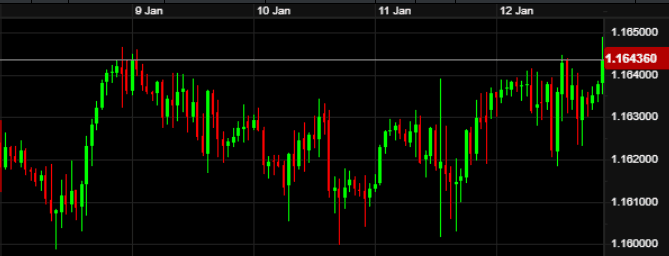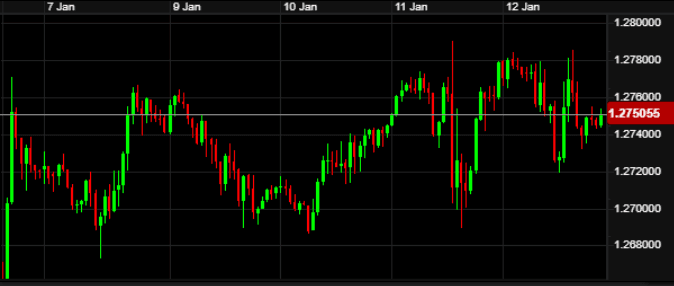ACM Update 15-01-24

We are a good few weeks away from pancake day, but Sterling-Euro spent the second week of January as flat as the proverbial. Little over 0.4% movement on the pair during five days, with sub 1% of movement on GBP-USD also. The latter saw some volatility due to the latest US inflation print.
This week starts with a US bank holiday followed by the latest round of UK unemployment, inflation and retail sales figures. The combination of these will deliver the best clues yet as to any upcoming action from the Bank of England on 1st February and beyond. World leaders and bankers find themselves in Davos, for the latest edition of the World Economic Forum.
Unlike the obvious recent geopolitical events in the news, economic headlines were somewhat few and far between over the last seven days. Sterling remained in a relatively static position, with markets waiting for further clues as to recent data.
In positive news, UK GDP bounced back by 0.3% from October to November, eradicating the equivalent negative figure from the previous month. Whilst a step in the right direction, it does still mean that the economy shrunk by 0.2% in the three months to November, according to ONS (Office for National Statistics) figures.
This is likely not good news for Mr Sunak in an election year, as without growth in December, the UK will have slipped into what most economists are already predicting will be a “mild” recession. Inflation and higher interest rates have inevitably weighed on consumers in 2023, but this pressure should ease in 2024.
The Government’s own Office for Budget Responsibility is predicting a growth of 0.7% for the year ahead. The independent body of the NIESR (National Institute of Economic and Social Research) meanwhile, are predicting a similar 0.2% growth for the first quarter. Thus it seems everyone is aligned that even if the UK falls into recession, it should indeed not be too painful. This is obviously barring unforeseen geopolitical factors.
The only other UK event was Andrew Bailey’s speech on Wednesday. The Bank of England Governor wouldn’t be forced into commenting on the outlook for monetary policy though. He simply stated that he was pleased to see mortgage rates were coming down, and hoped it would continue. He did also stress that he is monitoring the situation in the Red Sea, amid concerns that such “global shocks” will impact the UK economy. Oil prices rising may not help in the Bank’s battle against inflation.
Movements for GBP versus the Euro can be seen in the chart below:

On the continent, a relatively quiet week too for data. Retail Sales in the bloc continue to disappoint, with a twelfth month in a row where the figure has come in below the estimated number. Admittedly, some of these have retrospectively been revised up when the data was clarified. The November figure showed a drop of -0.3% when compared to the previous month, maintaining a picture of a general slowdown in the Eurozone.
The jobs market though seems better off, as unemployment bounced back down to 6.4% from 6.5% the previous month. The reading matches the 6.4% we saw a few months ago, which was the lowest recorded unemployment figure since the inception of the Eurozone. So, whilst consumers aren’t spending as much, the number of those employed does seem to be on the rise. Such figures though do remove members of the population too old/unable to work. President Lagarde has previously expressed her concerns about the growth of this portion of EU society.
Speaking of which, Lagarde spoke at an event in Paris on Thursday. She maintained her stance that the Eurozone isn’t in a serious recession, and that the worst of the battle against inflation is now behind them. She also raised her concerns about how a Trump election victory would be a “threat” to Europe, citing his previously-imposed trade tariffs and attitude to climate change, as the main points.
Over in the US, the biggest release was the US CPI inflation number for December. The metric showed a bounce back from 3.1% in November, to 3.4% in December. This exceeded analyst estimates of 3.2%, mainly attributed to the flattening of fuel prices from November to December. The core figure fell to its lowest since May 2021.
Overall, the US had an excellent year in 2023 for combatting inflation. As mentioned in recent weeks, the Dollar has been the biggest beneficiary if interest rate hikes over the last 18 months, and is now beginning to subside as the likelihood of interest rate cuts come into view.
Unemployment for now remains buoyant in America, with the weekly metric of those claiming benefits remaining as low as last month’s reading. This in turn was the lowest the figure has recorded since mid-October.
Moves last week on GBP-USD can be seen in the chart below:

The week ahead:
Monday – US BANK HOLIDAY
Tuesday – UK Claimant Count & Unemployment (07:00 UK time), Canadian CPI Inflation (13:30), Andrew Bailey speech (15:00)
Wednesday – UK CPI Inflation (07:00), US Retail Sales (13:30), Christine Lagarde speech (15:15), Federal Reserve Beige Book (19:00)
Thursday – Australian Unemployment Rate (00:30), ECB Monetary Policy Meeting Minutes (12:30), US Unemployment Claims (13:30), Christine Lagarde speech (15:15)
Friday – UK Retail Sales (07:00), Canadian Retail Sales (13:30)
A week of big data releases for the UK, which will be pivotal in determining policy action from the Bank of England into 2024. Important to note to all clients that Monday being a US bank holiday for Martin Luther King day, will mean no USD payments in and out for the day.
The latest report on UK inflation comes on Wednesday morning, with expectations of a slight fall from 3.9% last month to 3.8% in December. This would buck the trend seen in the Eurozone and US though, where inflation bounced back up over the same period, mainly driven by fuel prices flattening out, as eluded to earlier in this article.
The data would unlikely change the immediate policy moves of the Bank of England anyway, as the “higher for longer” mantra seems to be set for the majority of the voting committee. Other UK releases of Unemployment (Monday) and Retail Sales (Friday) will give a clearer picture of the overall health of the economy.
Eurozone news releases will be few and far between, bar the minutes from the latest ECB meeting which are published on Thursday lunchtime. Christine Lagarde has been fairly clear on the stance of the voting panel in recent meetings, so we shouldn’t expect any surprises here. Speaking of the ECB President, she has a couple of speeches at the World Economic Forum in Davos, which takes place all week.
Besides the US bank holiday on Monday, the US focus will be on the Federal Reserve’s Beige Book data release on Wednesday evening. This is the publication of the data Fed members use to assist their policy decision, produced for the public two weeks before the next meeting on 31st January.
As always, whilst markets have been flat recently that can quickly change. The upward trend in GBP-USD has provided favourable conditions for clients buying Dollars, with forward contracts (securing rates now for a date in the future) proving popular. Do reach out to the team to discuss more if required.
Have a great week.